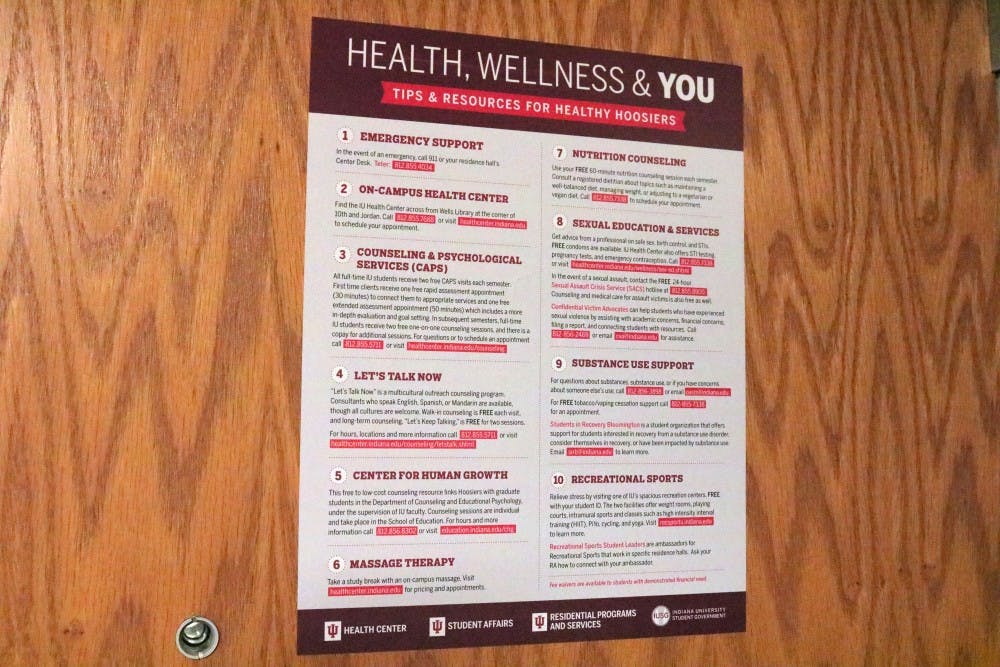In New Student Orientation and IU Health Center pamphlets, Counseling and Psychological Services is heralded as a useful resource for students to receive help for managing their mental health.
But it has a mixed reputation from the students it was created to serve.
“My appointments work with my schedule, but I know that’s not the case for everyone,” said Katie Janoski, a senior who has been using CAPS services since the spring semester of last year.
Students have referenced the limited amount of availability for individual counseling sessions, as many of them need more than just one or two sessions a month.
CAPS offers workshops covering subjects such as self-esteem, how to meet new friends and conquering procrastination. It also offers two free sessions for students who want to start individual counseling.
Janoski said her appointments have been relatively easy to schedule as she generally schedules a few a month when she needs them, but other students who depend on consistent sessions run into problems.
“I feel like I’ve had a different experience than most,” Janoski said. “I’ve been privileged to click with the counselor I had right off the bat.”
Marjorie Hubbard, a sophomore who has had years of experience with going to therapy, said CAPS' inconsistent availability can affect her ability to receive care.
“I have bipolar disorder, so I have to maintain really specific routines to stick to in order to not put myself at risk of experiencing an episode,” Hubbard said.
She said she prefers to have regular, biweekly appointments. When she went to her appointment Sept. 3, she couldn’t schedule her next session until Sept. 24, almost a full month away.
“It’s not their fault, they’re doing their best,” Hubbard said. “They just need more people.”
Hubbard said in the past she’s had difficulty navigating scheduling appointments around her classes, but front desk workers try to facilitate scheduling appointments.
“I’ve had a pretty positive experience because I’m pretty proactive about my health,” Hubbard said. “It’s not the type of thing where your parents can take you to the doctor and sort out your meds for you.”
Dr. Denise Hayes, the director of CAPS, emphasized the difference between the university’s services and receiving therapy from private practices.
“If you have that model, then you’re going to end up with a wait list," Hayes said. "Our goal is not to get full. Our first priority is to see as many students that are coming in as soon as possible.”
The recent increase of students reaching out for help has made that goal difficult. Hayes said in the past three years, there has been a 15% increase of students coming to CAPS and a 40% increase of students coming in for emergency services.
“The university counseling center is designed to meet the needs of 40,000-plus students,” Hayes said. “We never have enough. There’s only so many hours in a day.”
CAPS has 22 therapists, three psychiatrists and three sexual assault counselors, according to its website. In 2016, it was able to add four new counselors. There hasn’t been a new counselor hired since then until this year.
“We have run out of space to put them,” Hayes said. “We want to try to help students who think coming to the health center might be a barrier.”
CAPS counselors work on the third floor and fourth floor of the IU Health Center, the School of Public and Environmental Affairs building, the School of Optometry and Jacobs School of Music buildings.
Hayes said they have worked to add more programs and workshops for students to participate in between their sessions.
“It’s important that they know we’re a brief therapy model, different from private practitioners” Hayes said. “Our specialty is supporting students, and we’re here to respond to their needs in any way we can.”
CORRECTION: A previous version of this article stated four counselors were added in 2006. They were added in 2016. The IDS regrets this error.




